Category Archive for Caribbean
Puerto Rico Travels! Viator El Yunque rainforest tour review, Vianda San Juan restaurant, Condado & Isla Verde beach.
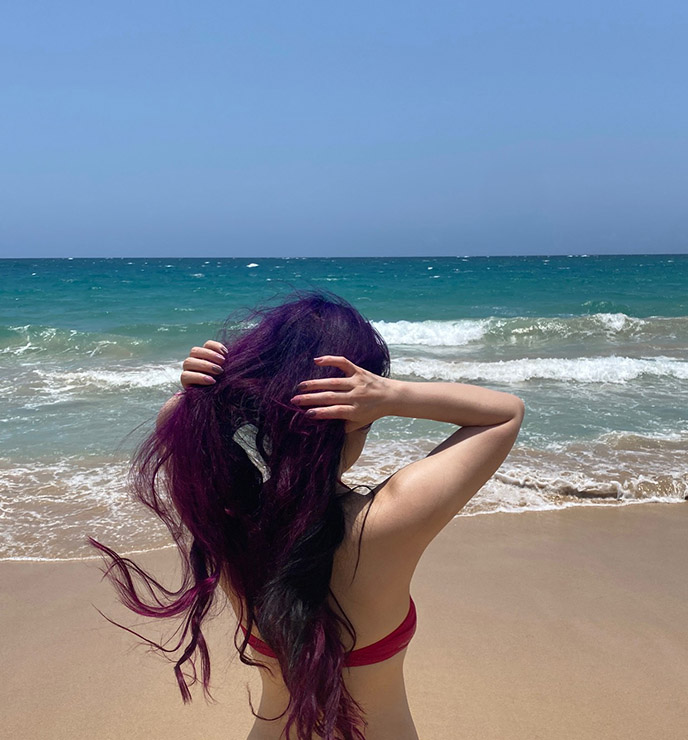
“Those grains of sand and waves are all waiting to take away what no longer serves you…”
In late May, I took some time off-line to fully appreciate Puerto Rico with one of my best friends, Molly. It was our first time on the Caribbean island, and we were intent on making the most of the uncrowded beaches and local restaurants. (Read on for a review of our outstanding dinner at Vianda.)

Read on for a guide to our favorite Puerto Rican spots, including a day trip to the lush rainforest, El Yunque, on a tour that we booked through Viator. (Still in awe over the waterfalls, rivers and mystical hiking trails…)

Molly and I stayed at an inexpensive Airbnb in San Juan, located within walking distance of Condado Beach. (I don’t recommend renting a car — you can easily Uber everywhere.) We ventured out for iced coffees and brunch at the nearby Pinky’s, and then made our way to the ocean.
(My red swimsuit is a Dolores Cortes Haiti bikini from UK Swimwear.)

San Juan has a laid-back and noncommercial feel that we loved. Condado Beach wasn’t crowded with tourists, all-inclusive resorts, or advertisements — anyone can access this public beach with picture-perfect waves.

For $20 (Puerto Rico uses US currency, as it’s a US territory), we rented an umbrella and chairs to keep us shielded from the sun. I took quick photos to show my mermaid hair… but most of the time, I’m huddled under a hat and parasol, with layers of mineral sunscreen!

Molly and I were keen to see the famous rainforest El Yunque, located an hour’s drive from San Juan. We booked this rainforest day tour through Viator, and it turned out to be one of the best small group touring experiences we’ve had.
Viator is the leading global experiences platform, with nearly 400,000 easy-to-book travel activities (including guided tours, sunset boat cruises, airport / car transfers, and more) worldwide.

I went to Viator.com and searched for Puerto Rico tours, and was delighted to find an enormous selection. I chose this El Yunque adventure on Viator (out of multiple rainforest tour options) because it had almost 100 excellent reviews, and the photos and details seemed like a perfect fit (ie, the hike was not too physically demanding).
Our outstanding guide, Isaac, picked us up directly from our San Juan Airbnb so we didn’t need to worry about transportation. After picking up four other guests from two nearby hotels, he took us on a small-group day trip to the famous rainforest, beginning at Yokahú Observational Tower.

Isaac riveted us with stories of the fascinating rainforest as he drove up the winding roads. El Yunque spans almost 29,000 acres, and is the only tropical habitat in the U.S. National Forest system. These peaks are typically rain-soaked, but we lucked out and had clear skies and views.
We walked up 98 steps to the top of Yokahu Tower for deep green panoramic views of El Yunque.

Then, our guide introduced us to Catarata Coca, a dramatic waterfall tumbling over a steep stone face and mossy boulders. (Swipe left on my Instagram post here to see video of this 85 foot tall El Yunque waterfall.)

To top it off, Isaac led us on a nature walk beneath the rainforest canopy, which opened up to one of the many rivers that flow through El Yunque. We met some charming creatures along the way, such as this curious orange lizard.
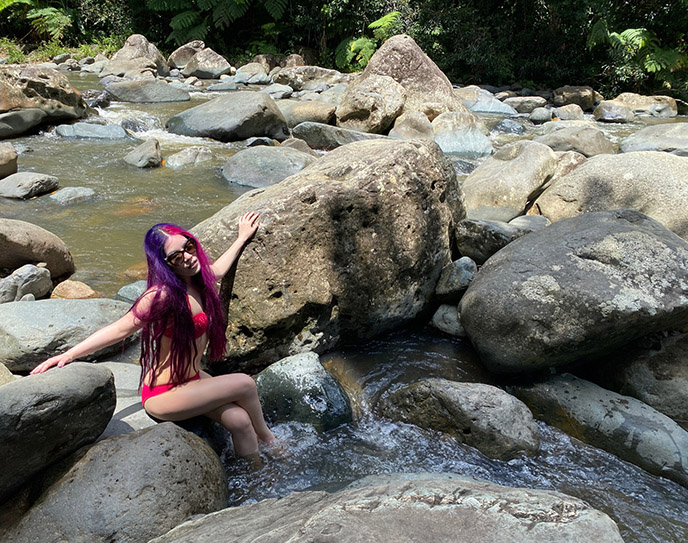
The leisurely day tour gave us plenty of time to take a dip in the Mameyes River, if we wished. While I waded around the rocks and streams, Molly dove in like a savage!
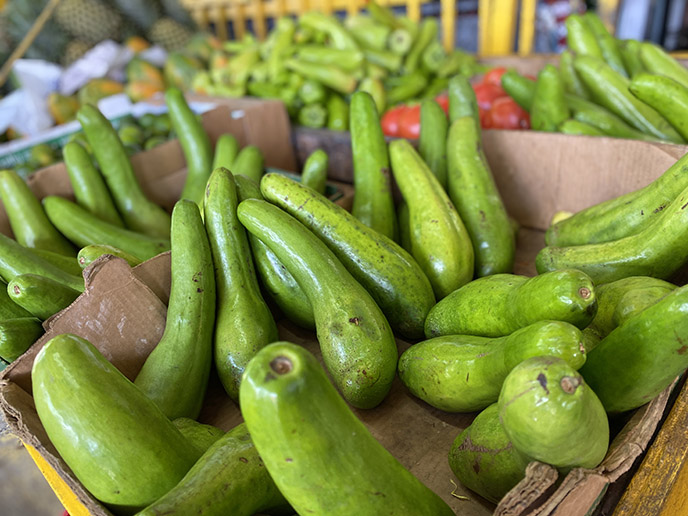
We were ready to eat after a day of rainforest exploration. Isaac drove us to a local food stand, where we could order fruit smoothies (including made from these odd banana-like avocadoes), and order Puerto Rican comfort dishes such as rice and beans, seafood croquetas, and plantain lasagna.

Molly and I are still talking about the rainforest magic we experienced on our day trip to El Yunque, which we booked through Viator. The tour included pick up and drop off, cold bottles of water, and a spectacular guide that let us dive into Puerto Rico’s rainforest.
Thrilled with our experience with Viator, a travel platform that offers flexible global bookings (with free cancellation and various payment options), and award-winning customer support.

After a long day of adventuring, Molly and I were ready to dig into dinner at Vianda. Opened in 2018, Vianda caught our eye because it consistently made the list of best places to eat in San Juan, Puerto Rico (and was named one of the 20 Best New Restaurants in America by the James Beard Foundation).
Owners Amelia Dill and Francis Guzmán brought 22 years of hospitality experience to their first restaurant. The Spanish word “vianda” comes from the Latin “vivanda,” which means a place of living. True to their name, Vianda brings to life creative and constantly changing dishes that rely on local ingredients and the flavors of Chef Guzmán’s Puerto Rican upbringing.

Vianda’s chic interiors, with trailing plants and mid-century modern wood accents, make it the perfect hangout for cocktails and dinner before a night out on the town.
The talented mixologist specializes in fresh infusions with a striking presentation. Vianda’s spin on the gin and tonic — with Botanist gin, grapefruit and rosemary tonic, citrus mist, and Gran Marnier — was the best that Molly had ever tasted.

The other outstanding craft cocktails we tried: a Cupina with mezcal, spicy chili liqueur, pineapple shrub, lime. And a Romero Apasionado with gin, rosemary passion fruit shrub, and lemon juice with the top torched for taste.

Vianda’s menu highlights fruits and vegetables from local farmers, many of whom are still working to restore their lands after the devastating 2017 Hurricane Maria. We shared an appetizer of raices locales with roasted roots, horseradish vinaigrette, dill and puffed quinoa. On the right: atun al pastor, a melt-in-your-mouth tuna with pineapple aguachile, radish, and cilantro (with peanuts on the side).

Vianda’s small farm-to-table menu is constantly evolving, drawing in a loyal clientele. (Wearing a dress by Too Fast.)

Much of the menu is anchored in the flavors of Puerto Rico, but plays with other influences such as Italian and Asian. The handmade ravioli, and striploin with chimichurri, piperade, and guanciale cream were exceptional — I wouldn’t be surprised if Vianda ends up with a Michelin star.

We didn’t want the meal to end… but at least it did on the sweetest note. In my mind, I’m still savoring the chocolate cake with white and dark chocolate mousse, vanilla and coffee pastry cream, and berries. The burnt caramel custard with cinnamon tuile, foster sauce, and caramelized bananas was also fresh and balanced.
Cheers to Vianda, a young and sophisticated restaurant that is certain to keep on making waves in San Juan.
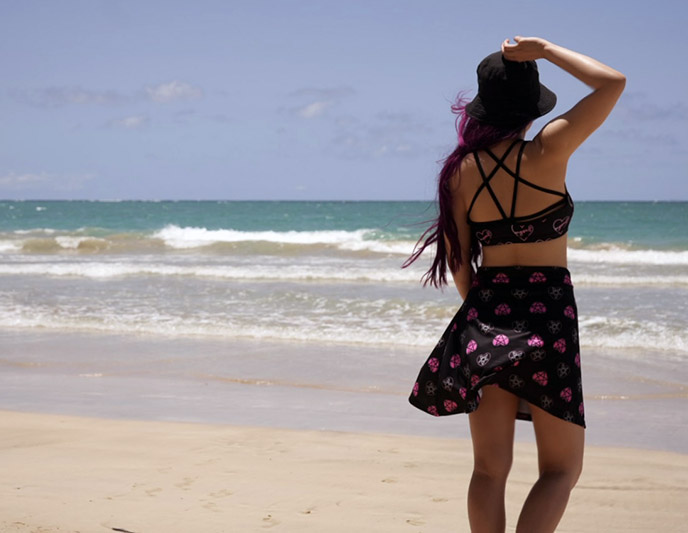
As you can see, there’s so much to enjoy in easygoing Puerto Rico. I got more “Goth on the beach” time at Isla Verde, a beach east of San Juan. I’m wearing an outfit by Too Fast: the pentagram straps and wrinkle/water resistant fabrics were perfect for the ocean.
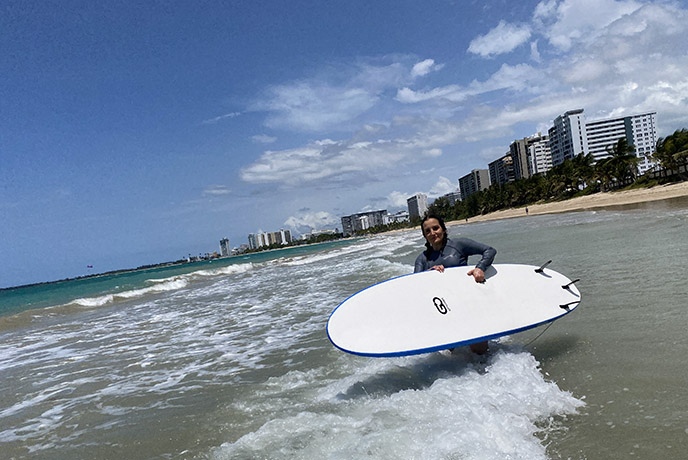
Molly did a surf lesson at Isla Verde, and stood up on the board for the first time! Other water sports and activities are available here, with equipment rentals and lessons at affordable prices.

Meanwhile, I relaxed on the shore. I brought my goat-head in a pentagram bag from Territory store in Osaka. (Owner Taiki-san recently passed, and his Satanic / occult shop is now closed… an enormous loss, and the Japanese dark subculture won’t be the same without him. Yet again, a reminder to make the most of life while we can.)

Hard not to smile at Puerto Rico’s warm ocean waves and uncrowded, clean beaches.

Since Puerto Rico is classified as a US territory, Americans do not require a passport to visit. Flights are also generally inexpensive from the east coast USA. (Just be careful with extra baggage fees and less-than-stellar service if you fly one of the budget airlines.)

This “Goth in hot weather” has been to a few destinations in the Caribbean. Puerto Rico stands out for its natural beauty, and San Juan is well-developed (lots of places to eat and stay) without feeling too touristic.
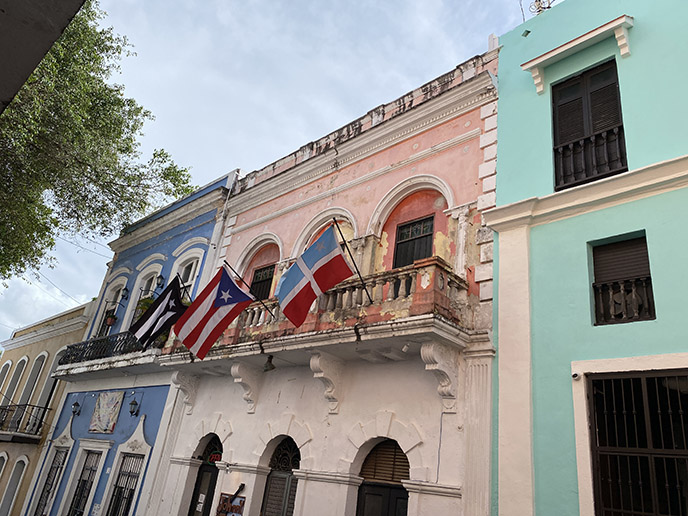
Old San Juan, the historic colonial district of the capital, is a must-see. We had a lovely day walking up and down the hilly cobbled streets, and admiring the colorful facades that shows a mix of architectural styles.
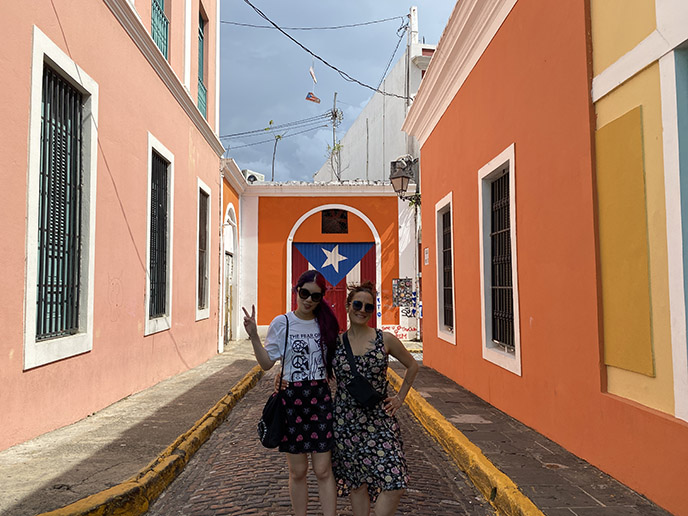
You’ll find lots of Instagrammable photo spots in Old San Juan. We posed in front of a door painted with a Puerto Rican flag, located at Calle de la Virtud, Viejo San Juan.
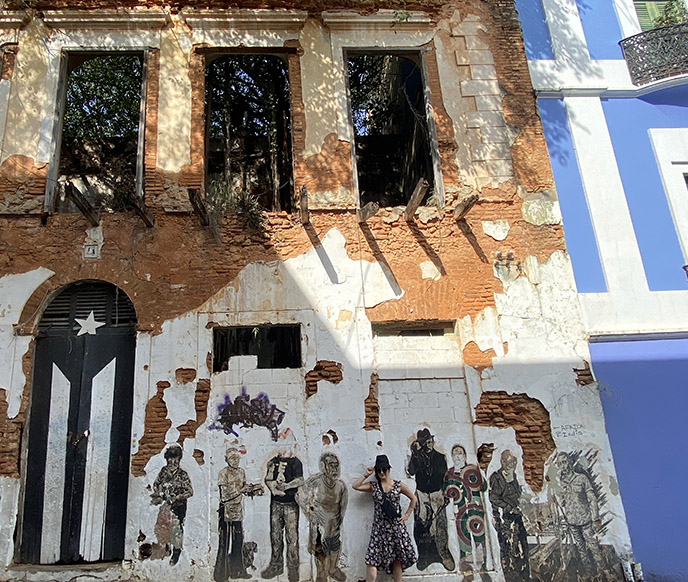
We also came across a black-and-white version of the flag, which symbolizes the people’s ongoing resistance in Puerto Rico (whether it is to colonization, corruption, or other issues).
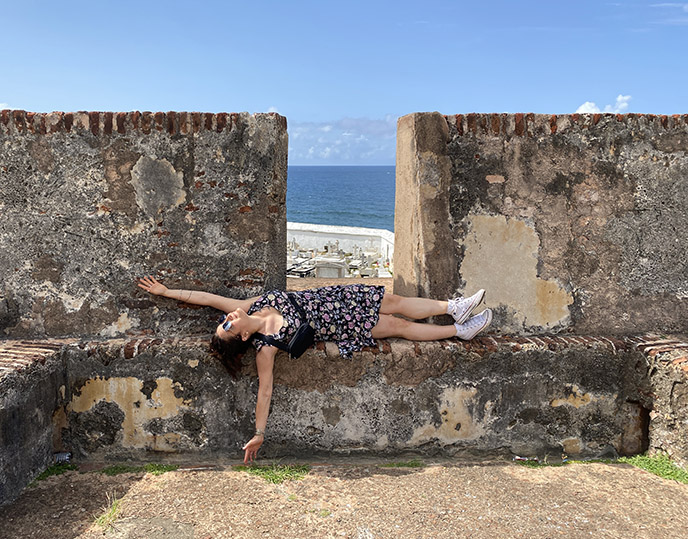
I think you can tell we had fun moseying around Castillo San Felipe del Morro, a 16th century citadel that protected San Juan from pirates.
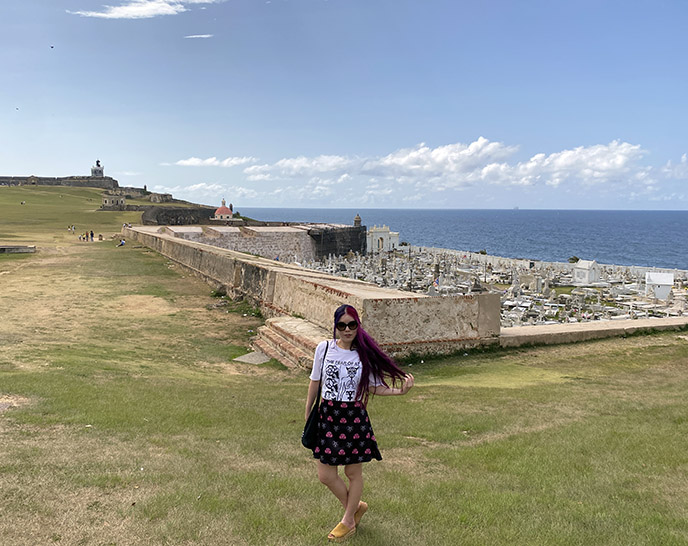
Next to the fortress is Old San Juan Cemetery – Santa Maria Magdalena de Pazzis, which features ornate Goth headstones overlooking the ocean.
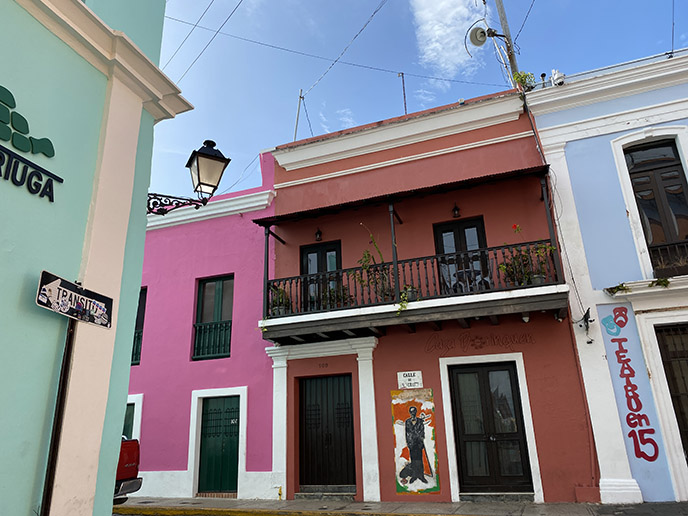
We enjoyed peeking at the local clothing and swimwear boutiques in Old San Juan, and admiring the rainbow buildings and balconies.
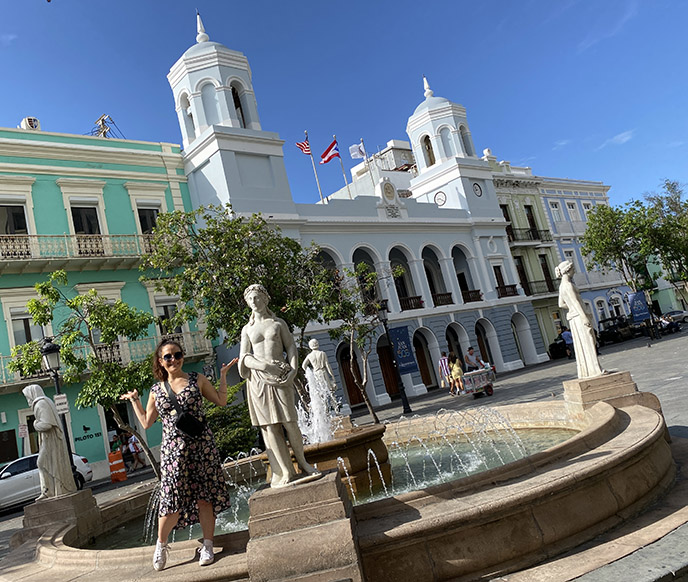
Get an iced coffee at the excellent Cuatro Sombras, and have lunch at a bare-bones Puerto Rican eatery such as Deaverdura, El Jibarito, or Vaca Brava.
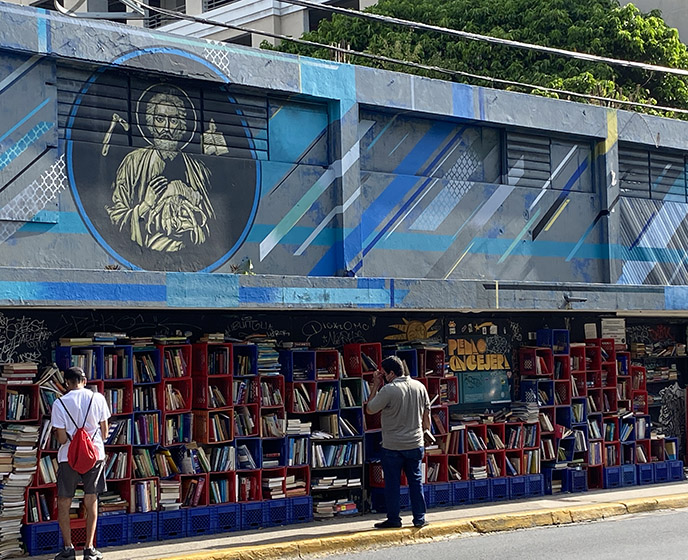
There’s also lots to see around the Condado beach area, including surf shops and the above bookstore. The clubbing / party district, La Placita de Santurce, is not far from here. (We weren’t into the rowdy club scene of La Placita, but loved watching locals dance la bomba, salsa, and more at the open-air Delavida.)

And be sure to taste all of Puerto Rico’s local specialties! We drank pina coladas (the coconut, rum, pineapple cocktail that originated here) and chichaito shots (made with Anisette liqueur and white Palo Viejo rum). In the district of Piñones, we had fresh-caught grouper with mofongo or trifongo (a mash made from plantains and yucca).

I hope this look back at Puerto Rico inspires you to plan a trip to the friendly island, and play in the waves yourself. (Red bikini by UK Swimwear.)
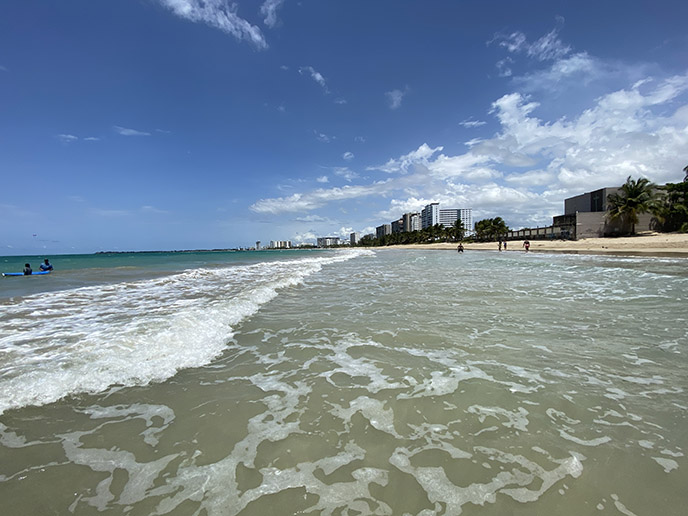
For more Caribbean travel stories, you can see my Dominican Republic adventure with Molly from five years ago (how time flies, and how things can change in unexpected ways). We’re both keen to do another trip soon… Got any destination suggestions?
SHARE & COMMENT
Cuba vintage car tour with Havana Urban Adventures! Renting a classic convertible, Callejon de Hamel Santeria.

When you think of Havana, Cuba — do classic cars come to mind? These sleek, 1950s-era automobiles are the only rides on the road in this fascinating country, where time seems to have frozen.
My dream was to ride down the Malecon in a vintage convertible… and this came true thanks to Havana Urban Adventures!

Urban Adventures offers one-of-a-kind, offbeat experiences in cities worldwide. These aren’t your typical tours; they’re small group or private adventures that let you dive deep into local life.
Read on to see how I cruised through Havana in this slick red “almendrón” (the Cuban word for antique auto)…

… and learned about Santeria (the Afro-Cuban religion of divine spirits), at the art-filled Callejon de Hamel.
(Photography by Asta Mail and me.)
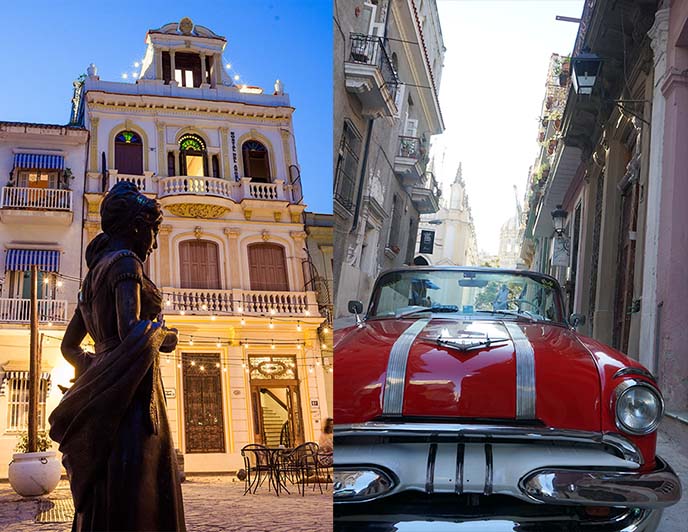
In my first post about Cuba, I wrote about the joy of staying in a “casa particular” (Prado Colonial) and supporting local businesses. (You can read the full review here; definitely reach out if you’re looking for an authentic place to stay in Old Havana.)
When we made a booking with Urban Adventures, we received vouchers with confirmations of the start time, location, contact details and other info. In our case, the classic car came straight to our front door to pick us up for the 2 hour ride.

“Best day ever” is accurate, when it comes to their tours. As you may recall, I also linked up with Urban Adventures in Athens and Bucharest. I’m impressed by how their guides are always full of passion for their hometowns. In this case, Armando (Mandy) greeted us with a smile, and whisked us off on an adventure.
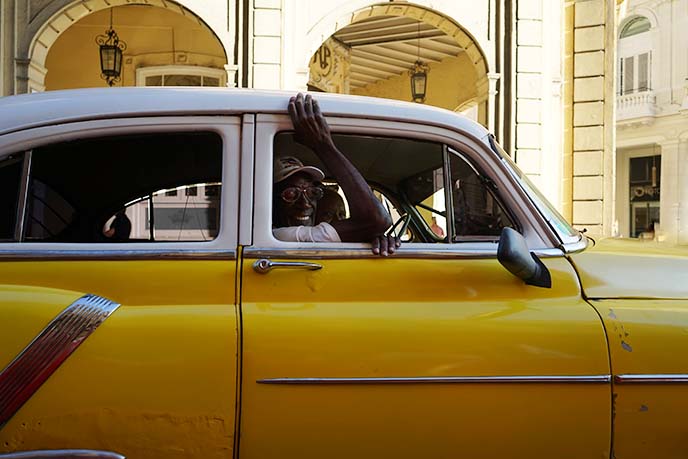
While the driver navigated, Mandy filled us in on the colorful sights around us. We rode through Habana Viejo and Miramar, where we glimpsed colonial architecture, monuments, and the glamorous Fifth Avenue. Such a joy to ride through these streets in an antique car, and soak it all in.

Our first stop: Plaza de la Revolución, or Revolution Square.
Behind me, you can see a memorial to Camilo Cienfuegos, one of the four leaders of the Cuban Revolution (along with Fidel Castro, Raul Castro and Che Guevara). Manny explained that “Vas bien, Fidel” (You’re doing fine) refers to the supportive comment he made to the leader during his speech to the people.
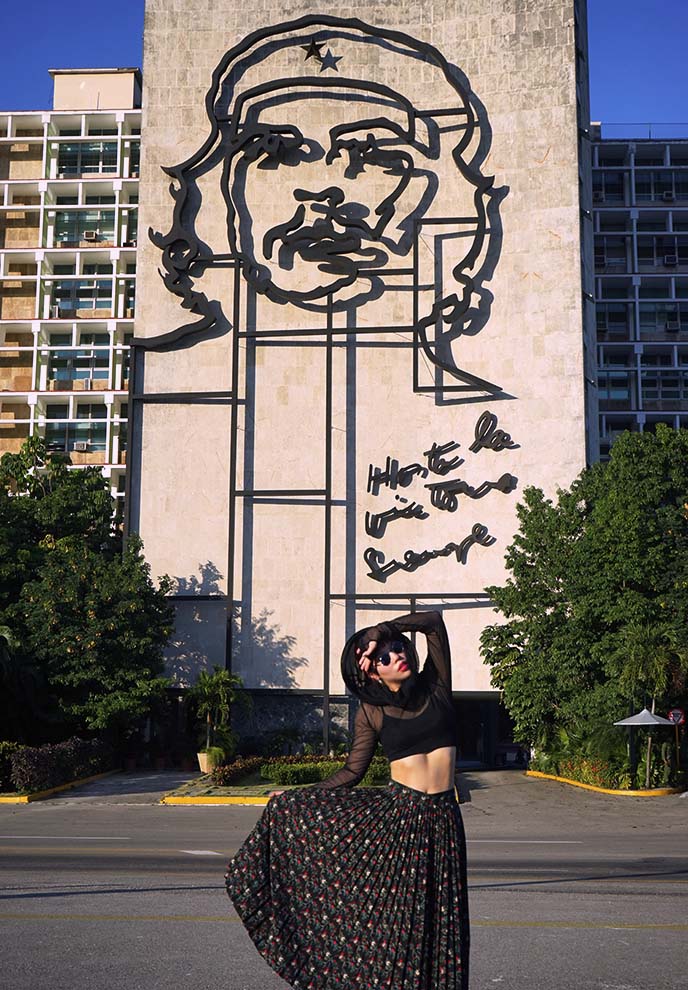
Next to him is this iconic counterculture portrait. I’m sure you recognize the face of Che Guevara, the guerrilla revolutionary! Che’s slogan, “hasta la victoria siempre” (Until victory always), exemplifies how he always strove to the fullest in his quest to help the people of Latin America.
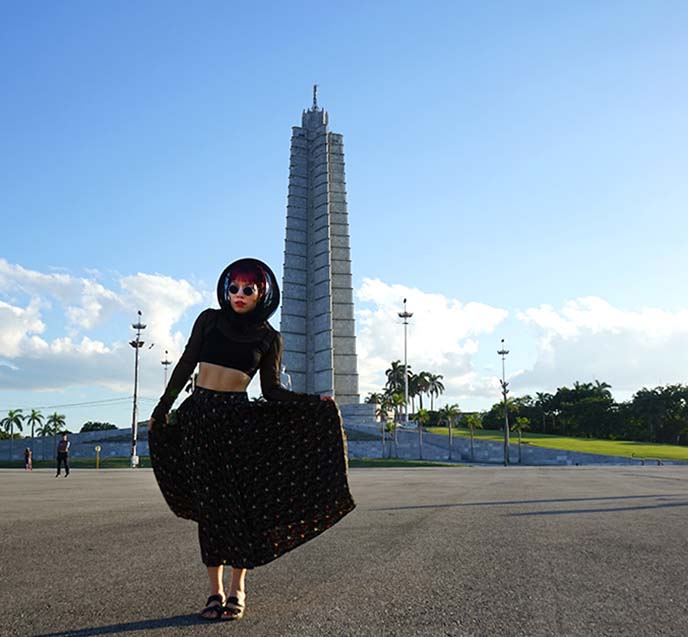
On the other side of Revolution Square rises José Martí Memorial. It’s a tribute to this 19th century national hero of Cuba, and consists of a statue of Marti, a star-shaped tower, and gardens.

Cuba has a fascinating political / cultural history that is unlike any other country (and very different from its neighbors in the Caribbean).
I was keen to learn more about the Communist takeover from a Cuban perspective, so I later visited the Museum of the Revolution (Museo de la Revolucion) in Old Havana. It’s filled with black and white photos of the leaders, and facts / records that may surprise you. I recommend it to all my fellow history buffs.

Onward to Vedado, a more modern and residential district of Havana. We drove through neighborhoods with beautiful homes, and then stopped in Havana Forest to take photos.
Outfit of the Day: Do you dig my Goth 1950s look? My hooded mesh black top is Cyberdog, my long floral skirt is from Hong Kong, and I’m wearing these exact John Lennon round sunglasses.
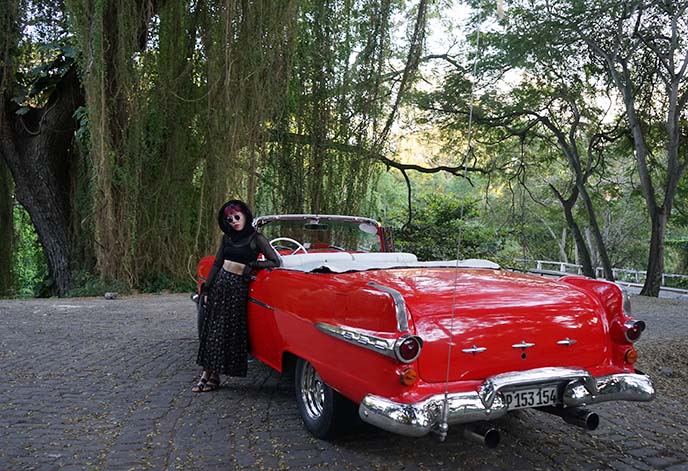
Asta and I were surprised to see this jungle area, in the middle of busy Havana! We took a moment to explore this lush park, featuring a river and waving trees.

Many Santeria practitioners come here to perform rituals in the stream, including animal sacrifices. Keep an open mind, and if you see worshipers dressed in white, don’t point a camera at them.
(There’s more on this Cuban religion further down in the post, so read on.)
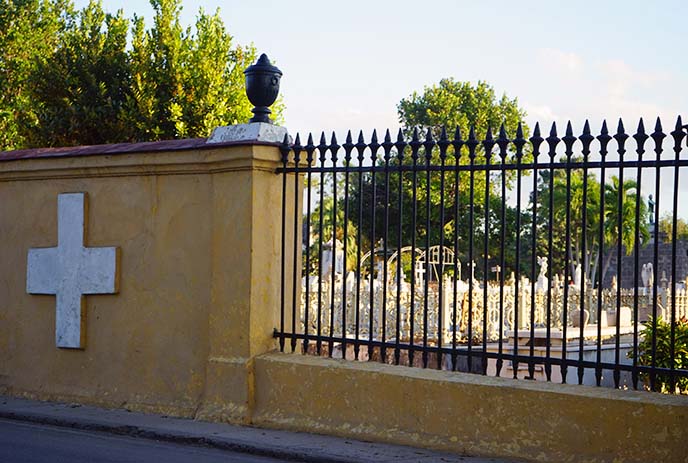
We passed by the sprawling Colon Cemetery, founded in 1876 in the Vedado neighbourhood. Named after Christopher Columbus, there are over 500 mausoleums covering 140 acres. I’ll have to come back next time to walk through this impressive graveyard, packed with white tombstones.

There’s truly no better way to get into the spirit of Cuba than by taking an old American car tour. What’s the deal with these antique vehicles everywhere?

In 1959, Fidel Castro banned foreign vehicle imports, making it impossible to purchase cars from abroad. Since then, pretty much the only wheels on the road are remnants from this era, when American expats cruised through Havana in hot rods.

Our Urban Adventures vintage car tour ended with a drive along the Malecon, as the sun was setting. We sat in the back of our cherry red convertible, and took in the soft breeze and warm light…. pure Cuba bliss.

I loved spotting cars with space-age “tail fins”, a 1950s signature. So many classic American names on the road here: Chevy, Plymouth, Buick, Ford, Oldsmobile.
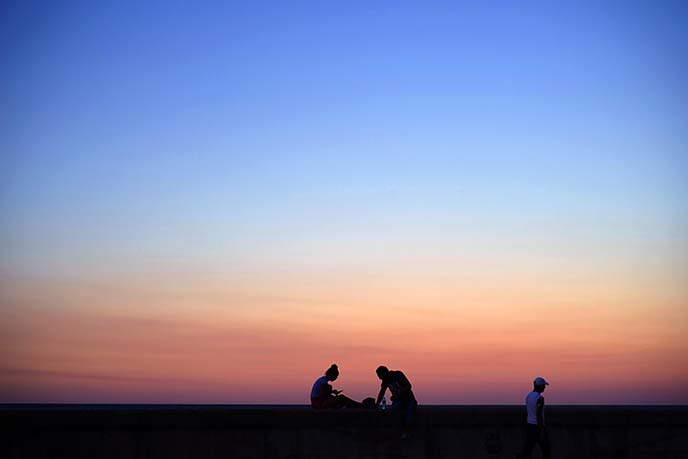
The Malecon is Cuba’s seawall, which wraps along the coast for 8 km (from Old to Central Havana, and ending in Vedado). You’ll see locals hanging out on the stone wall at all hours, but the scene is most beautiful at sunset.
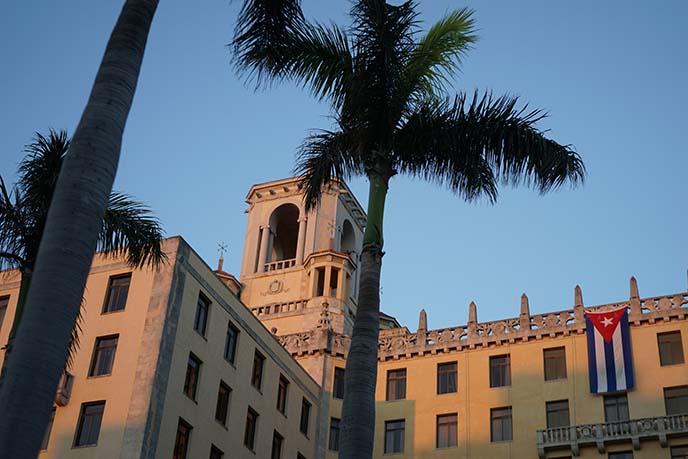
We ended the journey at The Hotel Nacional de Cuba. It’s a grand, historic hotel that was the favorite of 1930s American gangsters, famous crooners, and silver screen stars.

Inside, we looked at a display that celebrated National Hotel’s most famous guests, including Yuri Gagarin, the first human in outerspace (who met Castro in 1961, and was celebrated in Cuba). Such a cool spot to drink a Mojito and reflect on the old days.

I think these photos say it all… Urban Adventures’ vintage car tour is the sweetest way to explore the neighborhoods of Havana! More info here on how you can book a ride with them in an antique American convertible. (You can even put in a request for a specific car color.)

Asta and I loved our Urban Adventures tour so much that we did another the next day. We met guide Yanet for the Afro-Cuban religions tour, which let us explore Santeria and the local spirituality. As always, our experienced guide enabled us to get insider access to a subculture.
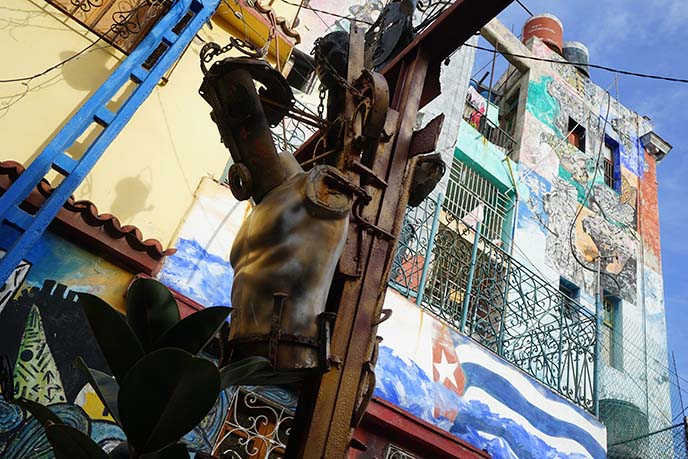
The journey takes place at Callejón de Hamel, a hub filled with alleyways of bright murals and sculptures. The artist, Salvador Gonzáles Escalona, began this project in 1990 to renew the surrounding neighborhood, and create a space for the Santeria community.

We admired the colorful paintings by Salvador, mixed in with works made from scrap objects like bathtubs, pinwheels and mechanical tools. The eclectic vibe reminded me of Philadelphia’s Magic Gardens.
I wore a rainbow-witch outfit that day. You can find many of my clothes for sale here on Depop; contact me if I can send you anything from my personal wardrobe!

Our guide, Yanet, explained the installations and spoke about the roots of Santeria. This Afro-Cuban religion has origins in the native spirituality of Africa, and became syncretized with Catholicism during colonial times (when slaves were brought to the New World).
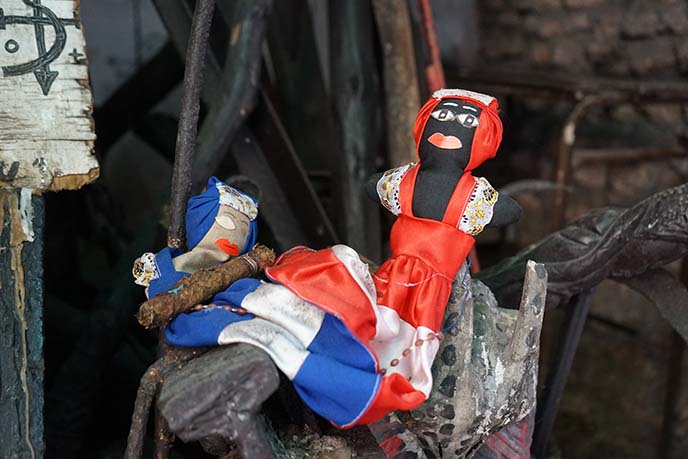
Cuba’s spiritual practices are a mix of local customs, folklore, and beliefs from various sources. Some people mistakenly associate Santeria with voodoo, but these two are very different (voudou is a syncretic religion practiced mainly in Haiti.)

Callejon de Hamel is free for anyone to visit. It’s hard to imagine that this once was a sketchy, desolate area: Salvador has transformed it into an inviting, positive space. You can often catch musicians and rumba dancers performing in these alleys.
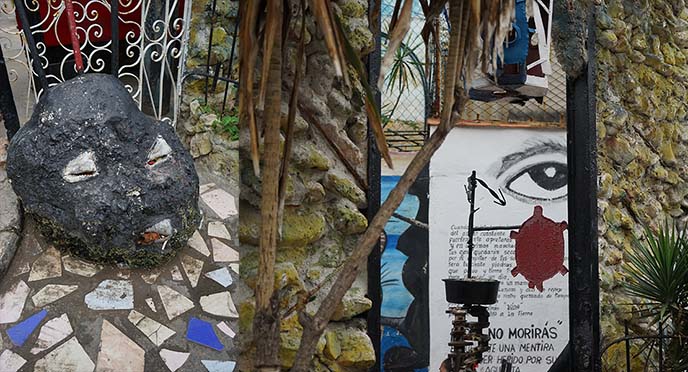
Yanet taught us about the orishas, or gods of the Santeria pantheon. One of my favorites is Elegua (on the left), represented as a playful child or old man. Visitors leave Cuban cigars in his mouth to keep this trickster happy.

There’s also a god of war (Changó), goddess of love (Oshún), a mother figure (Yemayá), a hunter (Ochosi), healer (Babalú Ayé) and more.

Santeria translates to “worship of the saints,” as there is a creator god and a number of lesser deities. These orishas rule over various aspects of human nature and endeavor, and you can call upon them depending on your particular situation.

When the colonialists shipped Africans to the Caribbean to work as slaves, they also baptized them as Catholics and banned their tribal faiths. However, the Africans still worshiped their orishas in secret, by associating them with Christian saints like St. Christopher. Santeria therefore developed as a unique syncretism.

We met a babalawo, or priest. His role is to be a spiritual adviser, and help people in various ways — including by fortune-telling with the tossing of shells.
Urban Adventures has special permission to enter the home of Salvador (the artist) and his family. We got to see their personal shrines to the orishas, where they make offerings of food, and bow in a way that touches each elbow to the ground.
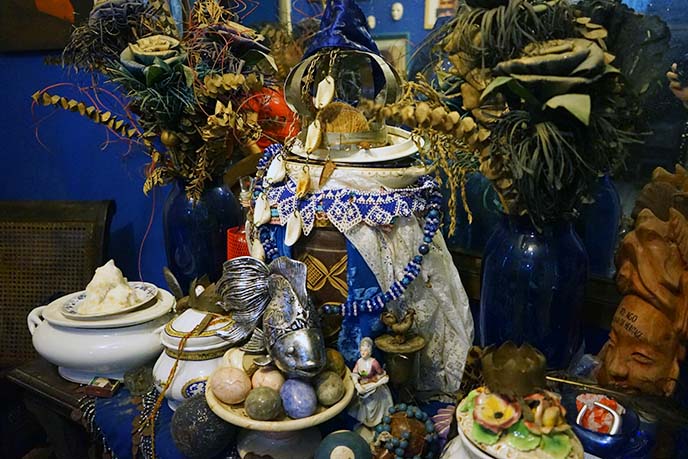
In Santeria, each practitioner is associated with one protector deity (which you determine through ritual and the advice of the babalawo). This family member’s orisha is Yemaya, the fierce mother of the seas — hence the blue decorations, shells, fish and other objects related to her.
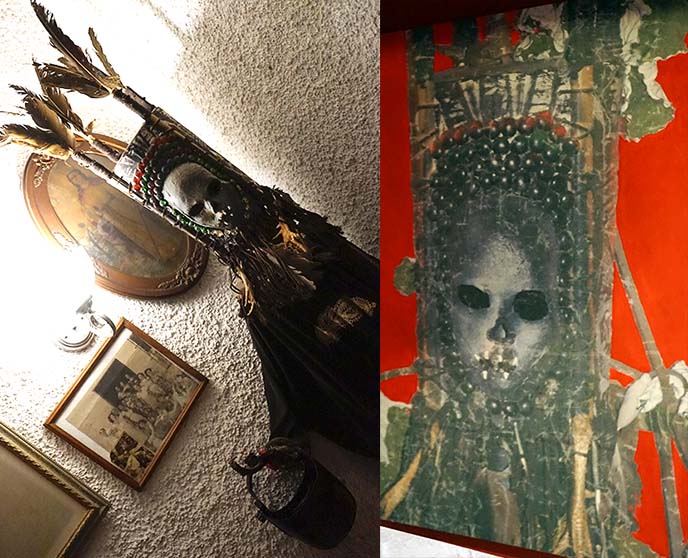
These personal shrines stay with them their entire lives. When Iku (the deity of death) arrives, the babalawo consults the spirits to find out what to do with the objects (burn them, bury them, etc).
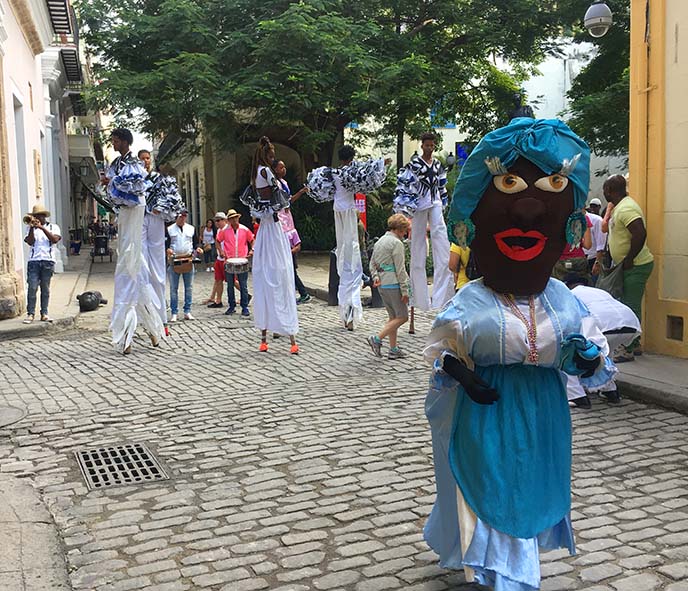
We loved learning about Cuban spirituality and culture up-close. If you simply walk through the streets of Old Havana, you’ll come across colorful aspects — like this costumed parade of stilt-walkers.
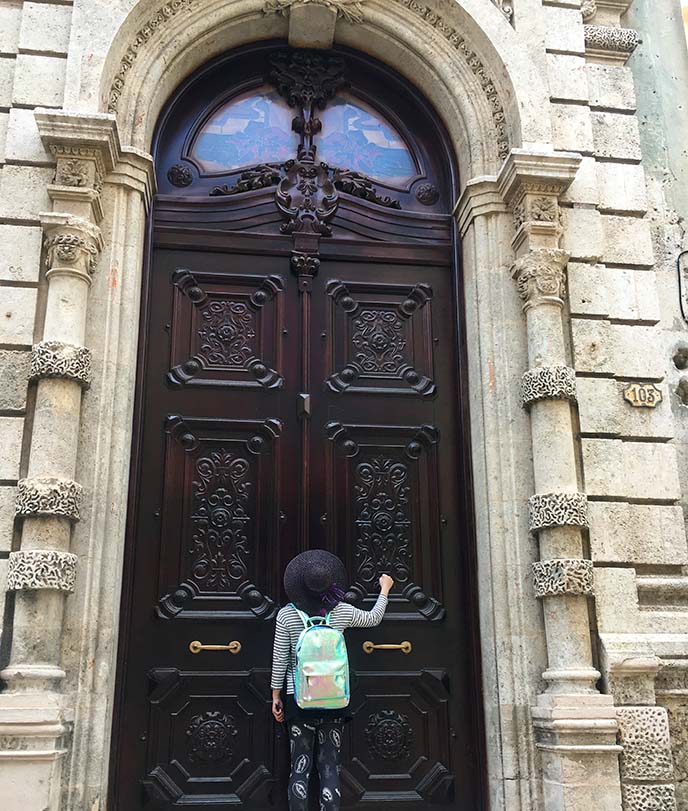
The colonial legacy is everywhere to be seen, especially in the dramatic architecture and tall doorways.

Havana is a safe city, and “chill” is the best word to describe the residents. You’ll see locals hanging out on doorsteps, and chatting with their neighbors.
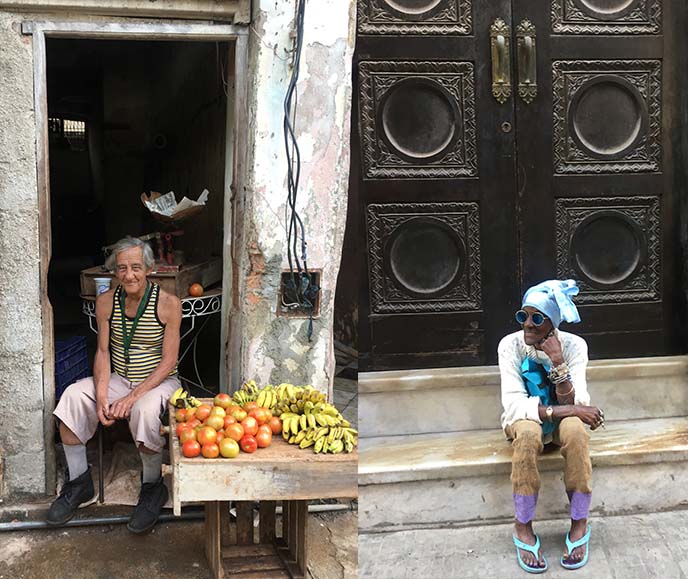
Headwraps and bright clothing are a common sight.
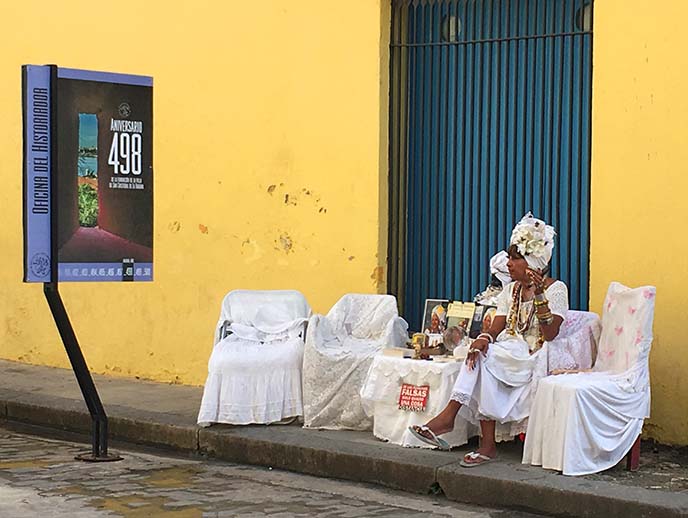
I came across a fortune teller, clad in white and with strands of beads draped around her neck.

Havana is also associated with author Ernest Hemingway, who lived here from about 1940-60. Many tourists visit his favorite bars, La Floridita and La Bodeguita del Medio, where he drank daiquiris and mojitos. (I didn’t visit, as I was more interested in seeing the romantic gardens all around Havana.)

We ran into more street art by Yulier Rodriguez. His provocative, signature style is unmistakable.

How fitting to find a motorcycle, in front of this mural of Che Guevara! When he was a young medical student, Che rode 5000 miles through South America (as documented in his book “The Motorcycle Diaries.”) The journey opened his eyes, and stirred his dream of seeing a united Latin America.
On the right, we see “Estudio, Trabajo, Fusil” (Study, Work, Rifle), the motto of Cuba’s Communist Youth Union.

It was interesting to learn the Cuban point-of-view of historical events and figures. They highlighted achievements such as the excellent medical and educational system, which is open to all Cubans regardless of their income.

Without doubt, Havana is a city of music and color! Where else can you pay 2 CUC ($2) for a mojito, and enjoy an energetic rumba?

These silly boys welcomed us back to our casa particular, Prado Colonial. I’m all about supporting small local businesses, and staying with a casa is one of the easiest ways to do so. (More info and photos of our hotel here.)

Gracias Havana Urban Adventures for making my “greased lightning” goals a reality! If only I could take this classic auto home as a souvenir…
Have you been to Cuba? Planning a trip? Feel free to leave a comment if I can help you with travel tips, and I’ll gladly reply.
 LA CARMINA
LA CARMINA






